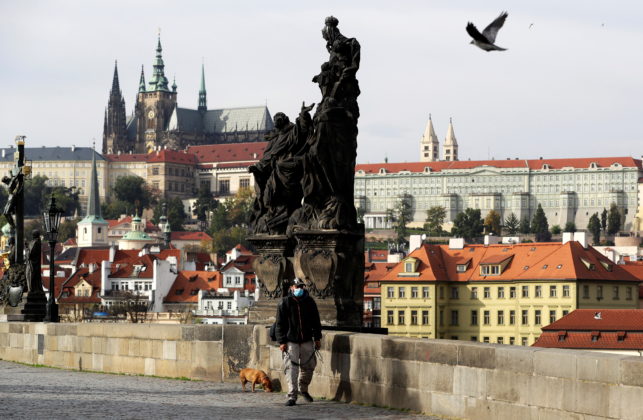By Jan Lopatka and Robert Muller
PRAGUE (Reuters) – The Czech government on Wednesday ordered most shops and services to close and sought to limit movement to essential trips only to curb Europe’s fastest growth in new coronavirus infections.
Health Minister Roman Prymula said the Czech health system would soon reach the limits of its capacity, despite massive increases in the number of beds and curbs on non-essential care, and that hospitals would run short of beds and personnel in November without immediate action.
The government said the measures would take effect from Thursday and stay in place at least until Nov. 3.
The country of 10.7 million was one of the more successful in Europe at curbing infections with swift shutdowns during the initial wave of the pandemic in the spring, but has seen the number of cases rise rapidly in recent weeks.
It reported 11,984 new cases for Oct. 20, the highest daily tally. Deaths jumped by 106 over the past 24 hours to 1,619.
“The measures, while quite robust and burdensome for the population, are absolutely necessary,” Prymula told a news conference.
Food stores, pharmacies and other essential services would remain open.
People will still be allowed to visit family when necessary and go to the countryside, weekend houses and parks. Assemblies of more than two people will be banned outside family members and co-workers.
‘STAFF EXHAUSTED’
Prymula said measures would be eased as soon as the “R” number measuring how many people get infected on average from each new coronavirus case dropped to 0.8, from the current rate of around 1.36.
The new measures are in addition to the closure of schools, bars and restaurants and orders to wear face masks in public.
The number of COVID-19 patients in hospitals soared to 4,417 by Tuesday, four times the number at the start of the month, leaving hospitals rushing to cancel non-urgent procedures.
“Staff are becoming very exhausted,” Prymula said.
Prime Minister Andrej Babis said 28 doctors from the U.S. National Guard in Nebraska would arrive to help next week.
Babis has been under pressure from the opposition and independent experts for failing to build a robust tracing system and refusing to re-introduce restrictions when infections started growing in the summer, before a regional election on Oct. 2.
“We made errors, probably yes, I can apologise again to all,” the prime minister told reporters. “At the moment it looks very bad, but I am convinced that these measures should work.”
(Reporting by Robert Muller and Jan Lopatka; Additional reporting by Michael Kahn; Editing by Gareth Jones and Alex Richardson)
 A man wearing a face mask walks his dog across the medieval Charles Bridge, as the spread of the coronavirus disease (COVID-19) continues in Prague, Czech Republic, October 20, 2020. REUTERS/David W Cerny
A man wearing a face mask walks his dog across the medieval Charles Bridge, as the spread of the coronavirus disease (COVID-19) continues in Prague, Czech Republic, October 20, 2020. REUTERS/David W Cerny



